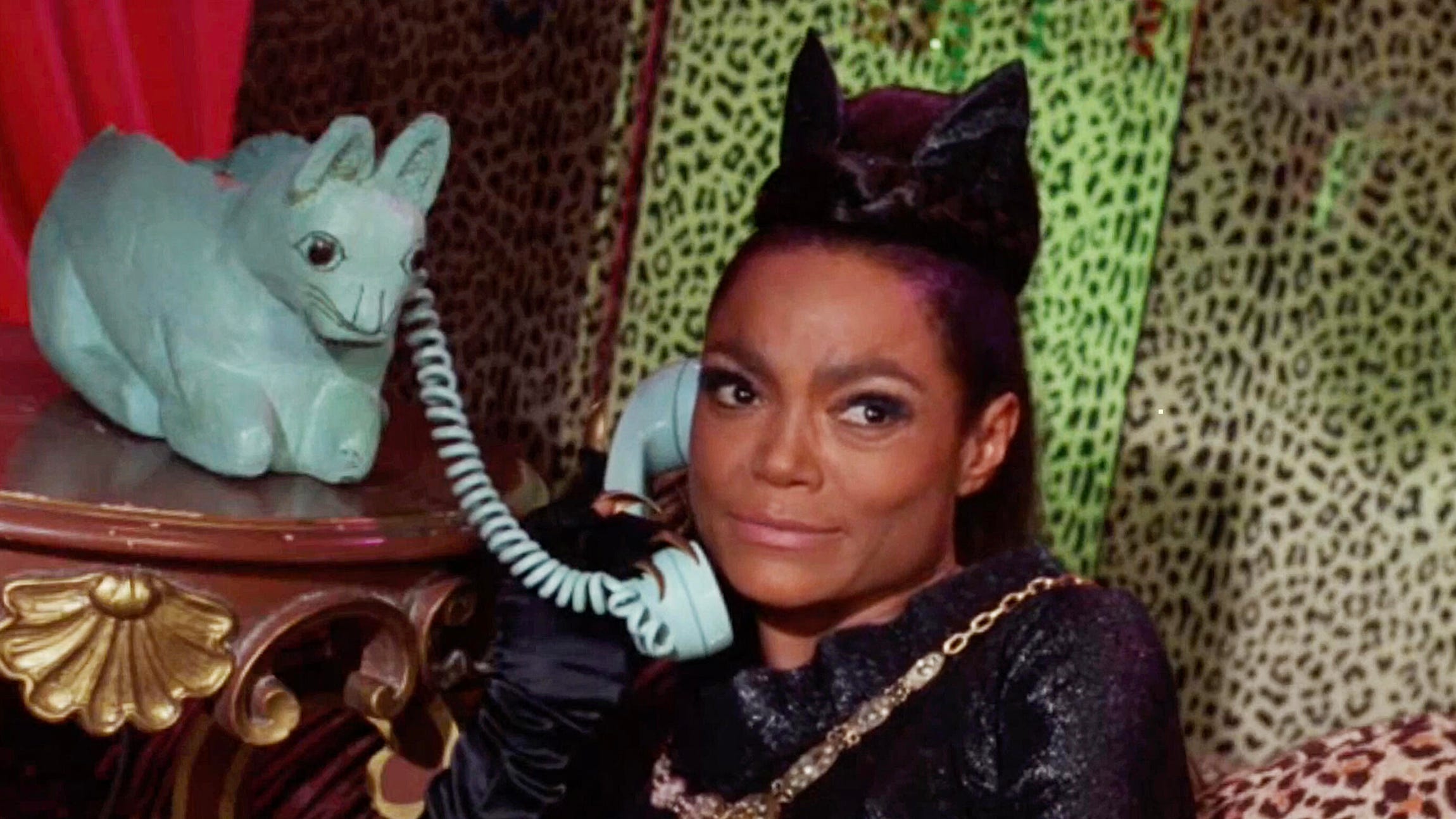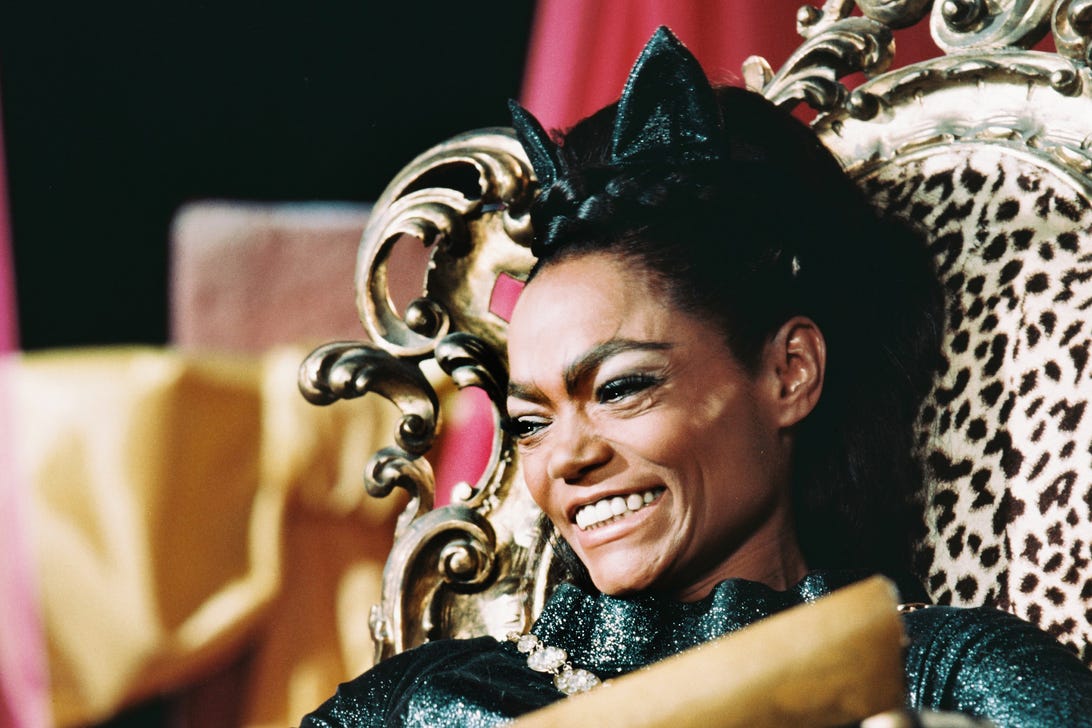
Eartha Kitt's Empowering Performance as Catwoman Turned a Short-Lived Role Into a Lasting Legacy
How her bold efforts on screen and off are still being felt today

ABC's live-action Batman was a campy, vibrant hippie haven. Boasting charismatic leads and mod décor crafted in acidic greens, playful pinks, and rich purples, the TV series starring Adam West and Burt Ward brought comic book lore to life for a new, broader audience in stylish '60s fashion. Its legacy lives on as a fun and faithful adaptation of Bruce Wayne's often retold story. However, the show is also defined by its dynamic enclave of unforgettable villains, including Eartha Kitt's cunning and irresistible Catwoman. Though she only appeared in five episodes, Kitt, who died in 2008, remains one of the show's most recognizable figures to this day.
Joining Batman's third and final season in 1967, the actress stepped in for the incomparable Julie Newmar, who inhabited the role for two seasons before departing to pursue other opportunities. Nevertheless, Kitt embodied the character as though it was written specifically for her, charming the show's titular hero -- and audiences -- with swiveled hips, a razor-sharp tongue, and that distinctive, velvety voice.
The Rise of Black Superheroes: A Black History Month Celebration
It's easy to forget that Kitt's role as Catwoman was so short-lived, a fact that speaks volumes about her memorable take on the classic character. First appearing in the episode "Catwoman's Dressed to Kill," Kitt owned the screen during her limited run with a unique, cat-like cadence that imbued the show with a new level of playful mischief we hadn't quite seen before. She exuded confidence while masterfully plotting against Batman (West), Robin (Ward) and Batgirl (Yvonne Craig) with complex schemes, like that time she nearly resold a stolen dress made of gold to the Queen of Belgravia. Kitt's Catwoman was also an astute inventor whose forward-thinking creations -- including a rope made of cat whiskers that retracted when it came in contact with body heat, like Batgirl's wrists and neck) -- kept Gotham City's heroes constantly on their toes. More than just a sexy thief in a glittery jumpsuit, Kitt's Catwoman was a force of nature -- and she was black.

Eartha Kitt, Batman
Silver Screen Collection/Getty ImagesThe '60s were a pivotal time for African Americans. Great strides were made on television with Star Trek's Lt. Uhura (Nichelle Nichols) and Diahann Carroll's sitcom Julia, which defied stereotypes about black women, and Ivan Dixon's Sgt. Kinchloe served up a formidable but affable military leader in Hogan's Heroes. However, prominent, complex roles for African Americans were still few and far in between. For those who had managed to break through Hollywood's color barrier, they faced not just external pressures but a self-appointed responsibility to enact change. The years in which Kitt appeared on Batman were some of the most turbulent of the Civil Rights Movement. In 1967, fresh on the heels of the Civil Rights Act of 1964, the Supreme Court delivered a landmark decision to strike down the ban on interracial marriage, making Kitt's sexually charged on-screen interactions with her white co-star (West) that same year all the more provocative. It was a volatile period marked by social unrest, including the race riots that erupted during that summer in more than 150 communities throughout the country, most notably Detroit. The following year, Martin Luther King Jr. was assassinated in Memphis, and, as thousands died overseas in the Vietnam War, upset civilians poured onto college campuses in waves to protest.
The Greatest Black Superheroes of All Time
For Kitt, Catwoman wasn't just a defining role but an empowering character that enabled her to be just as impactful in real life, as shown by her infamous confrontation with Lady Bird Johnson in 1968 during a luncheon at the White House. After she spoke up for black youth who had turned to crime to avoid being drafted in the war, Kitt's remarks were painted as those of an angry black woman, and she was met with a swift backlash. President Lyndon B. Johnson reportedly had her blacklisted from Hollywood and even prompted the CIA to keep a dossier on her, which derailed her career and forced the actress to seek out work overseas for the next decade. Alongside others like Harry Belafonte, Josephine Baker, and Muhammad Ali, who also used their fame to speak out on social issues, Kitt's bold efforts are echoed in today's generation of influential black celebrity activists, including Gabrielle Union and Billy Porter, who use their fame as a force for change. On-screen, Kitt's groundbreaking turn as Catwoman offered unprecedented visibility for melanated heroes and helped pave the way for others such as Luke Cage's Simone Missick and Black Lightning's Nafessa Williams and China Anne McClain to don their own superhero garb decades later.
On the show, she was Batman's unlucky antagonist, doomed to fail over and over again. But Kitt endures in the zeitgeist as a hero and a pioneer for black women everywhere who saw themselves reflected in these larger-than-life roles they had previously thought to be totally out of reach. She didn't just play Catwoman, she was Catwoman, and it was perfection.
For Black History Month, TV Guide is celebrating black superheroes in TV and film. As part of The Rise of Black Superheroes, we're honoring the legacies of pioneers like Luke Cage, War Machine, and actress Eartha Kitt; examining how blackness shapes the identities of characters like Iris West, Black Lightning, and John Diggle; exploring what today's black heroes mean to kids of color; and celebrating the greatest black superheroes of all time. You can check out more content from The Rise of Black Superheroes here.
